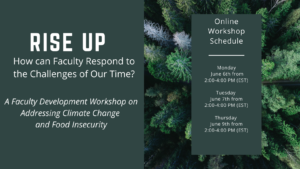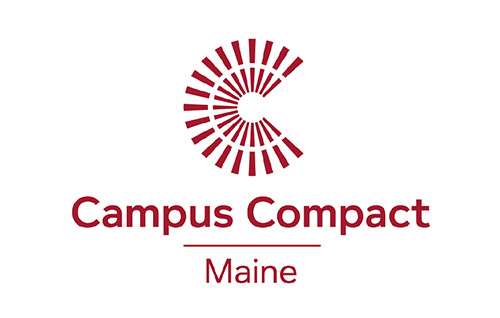 Join Us for a Free
Join Us for a Free
Faculty Development Training!
With our planet in crisis and communities being impacted by growing challenges, higher education is called to action to take the lead in addressing two of the world’s most pressing social issues: Climate Change and Food Insecurity. To help prepare faculty for this vital role, we are offering a timely one-week virtual course with three live sessions stemming from Maine Campus Compact’s Campuses for Environmental Stewardship (CES) program. This course will bring together faculty participants to consider ways to implement community-engaged teaching/learning while addressing many critical topics.
One Week Virtual Course with Three Live Sessions:
- Monday June 6th from 2:00 – 4:00 PM (EST)
- Tuesday June 7th from 2:00 – 4:00 PM (EST)
- Thursday June 9th from 2:00 – 4:00 PM (EST)
Facilitated by Jon Isham
Jon Isham has been on the Middlebury faculty since 1999. He co-founded the Middlebury Center for Social Entrepreneurship in January 2012, serving as its director until 2016. He was the director of Environmental Studies from 2011-2014 and was a Fulbright Scholar at Ashesi University in 2016-17. Jon currently teaches classes at Middlebury College about environmental policy, environmental economics, microeconomics, and social change.
Making the Most of Good Work:
The Intersection of Community-Engaged Learning and Career Readiness
|
|
Tuesday, December 7th from
3:30-5:15 PM (EST)
|
|
| Maine Campus Compact is pleased to host Making the Most of Good Work, a free virtual seminar for faculty, community-engagement officers, and career services professionals in higher education who are interested in discussing how community-based learning (CBL) fosters 21st century skills and how faculty can align their CBL projects to career readiness. |
|
Facilitated by Elizabeth Otto
Elizabeth Otto has taught communication skills in higher education settings for more than 20 years. Her scholarship has focused on what matters in an employment interview, a high-stakes communication interaction that serves as a gateway to paid work and dignity in our society. She has studied the ways that college students can use examples from community-engaged learning experiences as evidence of their career readiness in job interviews as a way to establish they have the real-world skills employers most desire. She is now beginning a new career chapter as a training and development specialist in a leadership development program for a Minnesota state agency.
|
|
|
 Join Us for a Free
Join Us for a Free

